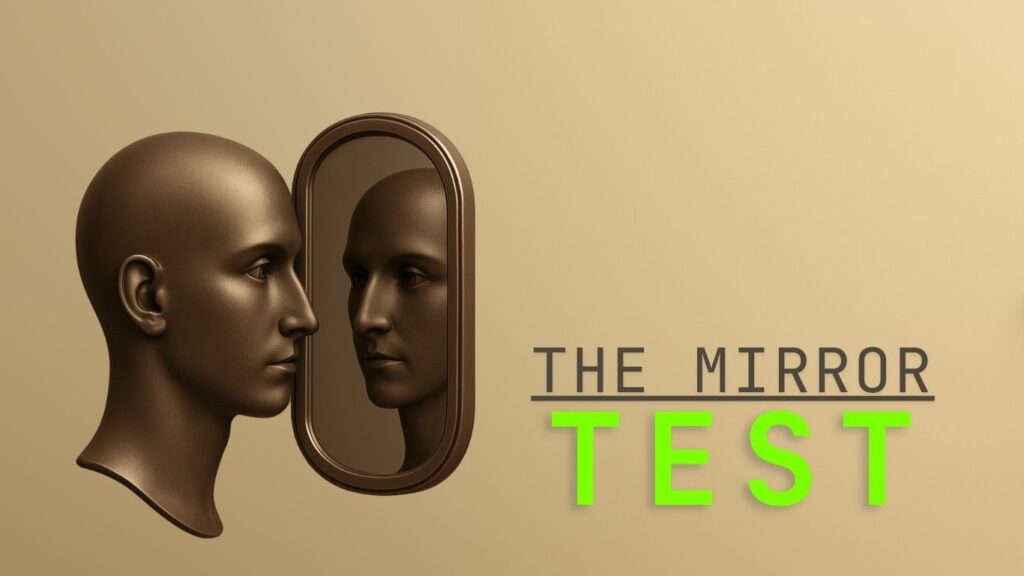Win at Life

The Mirror Test
mir·ror test
noun
Def. A simple self-check in which a person asks whether they could look themselves confidently in the eye, in the mirror, after making a decision or taking an action.
Used as a measure of personal integrity and alignment with your values.
What it is – and why it’s useful
The Mirror Test is one of the most straightforward tools for ethical decision-making. Forget endless pro-and-con lists.
At its core, it asks one question: “If I had to look myself in the eye afterwards, would I feel at ease?”
It is powerful because it bypasses the mental gymnastics we can do to justify decisions (we humans are so good at this). Instead of debating what other people might think, it points the laser pen straight at your sense of right and wrong.
Research on moral psychology shows that people often rely on intuitive reactions first, then rationalise afterwards. The Mirror Test catches you at that gut level, before the justifications start stacking up.
A quick story
The school I went to valued building character as much as succeeding in academics.
I am not proud to say that, when I was about seven, I was quite the toerag of a child. Cheeky, played to the gallery for laughs and bulldozed my way from one larking-about opportunity to the next. None of which is to excuse the fact that one day I wrote down a joke to pass to another child in class. While it was not outright mean-girl-mean, it was a little teasing/unkind about another child.
Not my finest hour – and in true Catholic style, I still feel a bit guilty about it, more than forty years later.
Sister Theresa, our teacher, intercepted the note. At the next breaktime, she gave me a little lesson that I have never forgotten. She said, “If you ever write something down, you should be happy for it to appear on the front page of tomorrow’s newspaper.”
That was long before the internet, which makes that advice even more relevant now, and it is essentially the same principle as the Mirror Test. Would I be proud to face myself if that note went public? Or VIRAL? The answer was no.
That moment planted a little seed of understanding in my scruffy little head that the small choices we make show us who we are.
You could take it further and run your own WWSTS test: What would Sister Theresa say about this? If what you are about to do, say, send or post – privately or otherwise – ended up splattered across the tabloids or going viral.
Would you still be comfortable?
If not, there is your answer.
Real-life examples
- Workplace dilemmas: You could take credit for an idea in a meeting. Would you be fine facing yourself afterwards? If not, stand down, soldier..
- Personal health: Skipping a planned workout when no one is watching. Are you going to be happy about that at 3 am when you wake up for a wee? Better get your trainers out.
- Relationships: Sending the text or posting the comment that you know will sting. The Mirror Test makes you pause and ask: Is this how I want to see myself? Is this my finest hour?
It is not about perfection, it’s about alignment. You are the one who has to live with your reflection every morning. The other people won’t be remembering what happened 40 years from now – but you might.
Do you see the person you want to see?
It matters because the standard you hold yourself to when you look in the mirror shapes your sense of self and ultimately your self-esteem. Each time you act in line with your values, you reinforce the belief that you can trust yourself.
Decision-making becomes easier because you are not pulled in a hundred different directions by other people’s opinions. Your confidence grows because you know you are doing all you can to be a decent, trustworthy person, living with integrity.
Try this
Before making your next decision, literally picture yourself in the bathroom mirror an hour later.
Imagine catching your own gaze.
Is it calm, steady and proud?
Or slightly evasive and a bit twitchy.
That tiny shift in imagined body language is surprisingly telling.
Some things to think about
- Integrity is easier to preserve than to rebuild.
- The Mirror Test doesn’t always mean choosing the easy option in the moment. Sometimes it means taking the temporarily more challenging path, but knowing you can face yourself.
- You can fool other people. You can even distract yourself. But the mirror tends not to lie.
Living true to yourself might look like living life on hard mode, but it’s actually the opposite; it smooths your way through memories you can be proud to look back on.
Optional challenge
For one day, make every small choice with the Mirror Test in mind.
What you eat, how you work, and how you speak to people. By the evening, notice how it feels to look in the mirror and know that, win or lose, you acted in a way you actually respect.
A Buddh-ish take
“Do not deceive.
Do not despise.
Do not speak harshly.
Do not live recklessly.” – Dhammapada
The Dhammapada isn’t a book designed to catch us out or tell us off.
It teaches us how to be happy.
The mirror is only glass.
What you meet there is your own conduct.
If you can face yourself without flinching, you have already passed the most important test.
